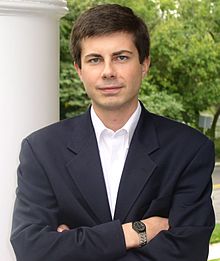 | |
| Mayoralty of Pete Buttigieg January 1, 2012 – January 1, 2020 | |
| Party | Democratic |
|---|---|
| Election | |
|
| |

| ||
|---|---|---|
 |
||
Pete Buttigieg served as mayor of South Bend, Indiana from 2012 to 2020. Elected in 2011 as a Democrat, he took office in January 2012 at the age of 29, becoming the second-youngest mayor in South Bend history, and the youngest incumbent mayor, at the time, of a U.S. city with at least 100,000 residents. During his mayoralty, he acquired the nickname "Mayor Pete".[1] Coming out as gay in 2015, Buttigieg became the first elected official in Indiana to come out while in office, as well as the highest-ranking Indiana elected official to come out. Buttigieg won reelection later that year. In 2017, Buttigieg unsuccessfully ran for chairman of the Democratic National Committee, pledging to resign as mayor if he had been elected. Buttigieg opted against running for reelection in 2019, instead launching a campaign for the Democratic presidential nomination in the 2020 United States presidential election. While he subsequently lost his bid for presidency, during his campaign he garnered a high national profile.
Buttigieg focused on urban development during his tenure as mayor. He supported numerous private developments. He also oversaw the sale of numerous city-owned properties to private owners. A key initiative of Buttigieg's first term was his Vacant and Abandoned Properties Initiative, also known as "1,000 Properties in 1,000 Days". This initiative reached its goal of repairing or demolishing 1,000 blighted properties across the city. In his second term, he completed two major infrastructure projects: a $150 million "Smart Sewer" project and a $25 million complete streets program named "Smart Streets" (the latter of which received national accolades). He he also took a number of steps to commit the city of South Bend to greater environmental stewardship. This included creating the "Carbon Neutral 2050" plan for the city, which was adopted by the city council. After facing public pressure for the city to act, Buttigieg had the city collaborate with other entities to fund lead paint remediation efforts. He had previously argued that action on remediating levels of lead in South Bend was task for the state government and not the city government. Buttigieg launched a pilot program to provide residents with funding for home repairs, which he subsequently expanded into a larger program. He also funded improvements to city parks.
Buttigieg also established a city identification card program by executive order. Buttigieg promoted the idea of moving the city's South Shore Line station from South Bend International Airport to the city's downtown. He additionally started a municipal ID card program.
Buttigieg's early tenure had been marred by a scandal involving South Bend Police Department Chief Darryl Boykins illegally recording officers. This led to Buttigieg demoting Boykins, and ultimately asking for his resignation. The firing of the city's first African American police chief sparked backlash. Another controversy during Buttigieg's mayoralty was his actions regarding the opening crisis pregnancy center in South Bend. Buttigieg vetoed rezoning that would have allowed the center to open near an existing abortion clinic. However, he thereafter offered help in finding the crisis pregnancy center an alternate location to operate, with this latter action being criticized by some abortion rights organizations as inconsistent with Buttigieg's pro choice positions. He has also been criticized for South Bend's failure to diversify the racial makeup of its police force, something for which Buttigieg in 2019 conceded failure on his part.
- ^ Gabriel, Trip (January 1, 2020). "He's Not 'Mayor Pete' Anymore: Buttigieg's Successor Is Sworn In". The New York Times. Archived from the original on February 12, 2020. Retrieved February 12, 2020.

